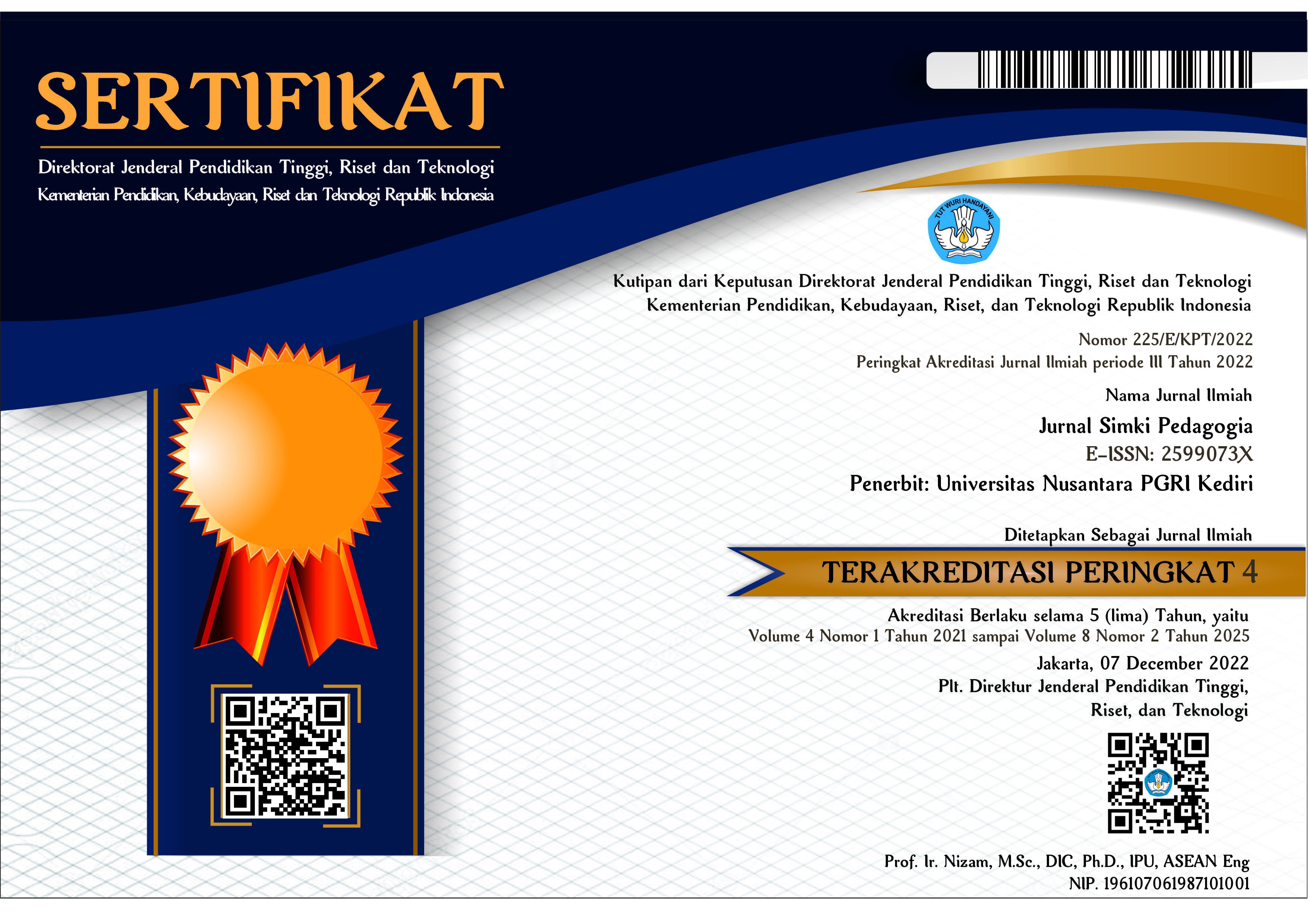Implementation of Life Skills for Children with Disabilities At SDN Dringu
 Abstract views: 366
,
Abstract views: 366
,
 PDF downloads: 163
PDF downloads: 163
Abstract
The purpose of this research is to prepare children with disabilities academically, socially, and emotionally in facing difficulties and life problems that require them to have life skills so that they can be more independent and not rely on others and can stand on their own feet someday. The research was conducted through a qualitative approach, where the targets of this research were students with disabilities at SDN Dringu. There are several stages in the implementation of this life skill, the first is the introduction of the concept of life skills, then the second stage is to gain learning experience with the implementation of life skills and the last is the review of children with disabilities. The results showed that the implementation of life skills for students with disabilities there can be applied quite well by students there, as evidenced by our interviews with homeroom teachers and students, where the homeroom teacher felt this, 1-2 children began to show quite good behavioral changes despite the short duration of our research. besides that, students voluntarily help group friends who have difficulties, they have dared to interact with others, and the relationship between friends becomes closer. These reflective skills are seen as an important aspect of teachers' ability to flexibly adjust their teaching to make optimal choices in response to students' learning progress.
Downloads
References
Briggs, M., & Van Nieuwerburgh, C. (2010). The development of peer coaching skills in primary school children in years 5 and 6. Procedia - Social and Behavioral Sciences, 9, 1415–1422. https://doi.org/10.1016/j.sbspro.2010.12.343
Chen, C. H., & Yang, Y. C. (2019). Revisiting the effects of project-based learning on students’ academic achievement: A meta-analysis investigating moderators. Educational Research Review, 26(October 2018), 71–81. https://doi.org/10.1016/j.edurev.2018.11.001
Epti Nur Cahyaningrum, Eddy Sutadji, & S. (2013). Hubungan Antara Life Skills Siswa Dengan Hasil Belajar Praktikum Pengelasan Di Smkn 1 Trenggalek. 211–223. https://journal.um.ac.id/index.php/teknik-mesin/article/view/3819
González, G., & Skultety, L. (2018). Teacher learning in a combined professional development intervention. Teaching and Teacher Education, 71, 341–354. https://doi.org/10.1016/j.tate.2018.02.003
Jannah, F., Hattarina, S. Arianti, D. (2023). The Implementation Of Educational Games as a Digital Learning Culture in Elementary School Learning. 7 (5),5523-2230 https://mail.obsesi.or.id/index.php/obsesi/article/view/5127
Kasdriyanto, D. Y., & Wardana, L. A. (2022). Pengembangan Media Scrapbook Berbasis Picture And Picture Berorientasi Wawasan Kebangsaan. 6(1), 271–278. https://doi.org/10.31004/obsesi.v6i1.1255
Kazemi, R., Momeni, S., & Abolghasemi, A. (2014). The Effectiveness of Life Skill Training on Self-esteem and Communication Skills of Students with Dyscalculia. Procedia - Social and Behavioral Sciences, 114, 863–866. https://doi.org/10.1016/j.sbspro.2013.12.798
Khoirin Nida, F. L. (2018). Membangun Konsep Diri Bagi Anak Berkebutuhan Khusus. ThufuLA: Jurnal Inovasi Pendidikan Guru Raudhatul Athfal, 2(1), 45. https://doi.org/10.21043/thufula.v2i1.4265
Lisievici, P. (2015). Teachers in Distress: Using Lifeskills Helping Framework to Identify Counselling Needs of Secondary Teachers in Romania. Procedia - Social and Behavioral Sciences, 165, 108–115. https://doi.org/10.1016/j.sbspro.2014.12.611
Magnusson, C. G., Luoto, J. M., & Blikstad-Balas, M. (2023). Developing teachers’ literacy scaffolding practices—successes and challenges in a video-based longitudinal professional development intervention. Teaching and Teacher Education, 133(July 2022), 104274. https://doi.org/10.1016/j.tate.2023.104274
Moniaga, J. V., Ohyver, M., Siregar, J., & Yauwito, P. H. (2019). Map-type modelling and analysis of children stunting case data in Indonesia with interactive multimedia method. Procedia Computer Science, 157, 530–536. https://doi.org/10.1016/j.procs.2019.09.010
Rulyansah Afib, Wardana Arya Ludfi, H. I. U. (2018). Pengembangan Media Pembelajaran Pop Up Dengan Menggunakan Model Stad Dalam Meningkatkan Hasil Belajar Siswa. Pedagogy, 6(1), 53–59. https://ejournal.upm.ac.id/index.php/pedagogy/article/view/330
Vors, O., Adé, D., Gal-Petitfaux, N., Joing, I., & Andrieu, B. (2024). Mixed methods in sport education for the analysis of activity and experience. Staps, 141(3), 5–19. https://doi.org/10.3917/sta.141.0005
Wardana, L. A., Jauharotur Rihlah, Ahmad Izzuddin, Serlin Velinda, & Tri Bagoes Pranoto Sanjoyo. (2023). Utilization of Lifeskill Oriented Interactive Multimedia to Overcome the Negative Impacts of Gadget Use on Children in Probolinggo. GANDRUNG: Jurnal Pengabdian Kepada Masyarakat, 4(2), 1216–1225. https://doi.org/10.36526/gandrung.v4i2.2871
Wardana, L. A., Rulyansah, A., Izzuddin, A., & Nuriyanti, R. (2022). Integration of Digital and Non-digital Learning Media to Advance Life Skills of Elementary Education Students Post Pandemic Covid-19. Pegem Egitim ve Ogretim Dergisi, 13(1), 211–222. https://doi.org/10.47750/pegegog.13.01.23
Winarsunu, T., Iswari Azizaha, B. S., Fasikha, S. S., & Anwar, Z. (2023). Life skills training: Can it increases self esteem and reduces student anxiety? Heliyon, 9(4), e15232. https://doi.org/10.1016/j.heliyon.2023.e15232
Copyright (c) 2025 Faridahtul Jannah, Ludfi Arya Wardana

This work is licensed under a Creative Commons Attribution 4.0 International License.

Jurnal Simki Pedagogia : https://jiped.org/index.php/JSP/index is licensed under a Creative Commons Attribution 4.0 International License.
















